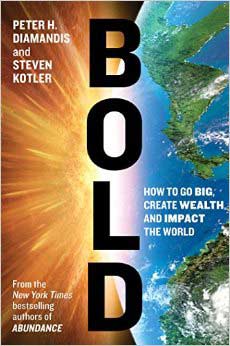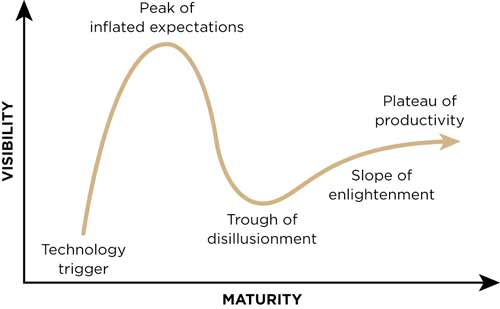When done right, tech investing can be the single best wealth engine ever. One thousand dollars invested in Apple Inc. (Nasdaq: AAPL) 10 years ago today would now be worth $20,610; the same amount invested in Google Inc. (Nasdaq: GOOG, GOOGL) a decade ago would now be worth $5,228.
Of course, not every company is an Apple-sized profit machine. That's why tech investors are always looking for a "Eureka!" moment.
"The beauty of the 'eureka moment' is that you find a great long-term investment - and you get out in front of Wall Street and other investors," Money Morning Tech Specialist Michael A. Robinson told readers in February.
 For that reason I was excited to pick up Bold: How to Go Big, Create Wealth, and Impact the World on its Feb. 3 release. I wanted to see what kind of moonshot thinking coauthors Steven Kotler (best-selling author and science journalist) and Dr. Peter H. Diamandis (Chairman and CEO of the X PRIZE Foundation) had in store.
For that reason I was excited to pick up Bold: How to Go Big, Create Wealth, and Impact the World on its Feb. 3 release. I wanted to see what kind of moonshot thinking coauthors Steven Kotler (best-selling author and science journalist) and Dr. Peter H. Diamandis (Chairman and CEO of the X PRIZE Foundation) had in store.
Back in 2012, the two authors published Abundance: The Future Is Better than You Think. That book debuted at No. 2 on the New York Times best seller list, and also launched at No. 1 on both Amazon.com's and Barnes & Nobles' best seller lists. And Bold itself just hit No. 2 on the New York Times business list and has been there for five straight weeks.
Together in Bold, Kotler and Diamandis talk about how tech entrepreneurs come to be successful - not just in terms of wealth creation, but also in terms of having a worldwide impact. They preach "to become a billionaire, help a billion people."
The innovators in focus will drive the sector's best wealth-creation opportunities for years.
That's why this 336-page manifesto - that wasn't explicitly written for tech investors - has more to offer them than any other book due out this year.
I phoned Steven Kotler to talk more about Bold and tech investing in 2015. He talked about how to spot a disruptive technology, his favorite sectors in tech right now, and why two U.S. CEOs are his favorites today.
Take a look (and keep reading to get our just-released "Million-Dollar Tech Portfolio" with five stocks and two ETFs for 2015)...
Kotler on Bold for Tech Investors
Money Morning: Steven, thanks for taking the time to talk to our readers. First, I'd love to know how the average tech investor can recognize a technology that will disrupt markets.
Steven Kotler: We don't think it's tricky. Technologies become exponential once they become information technologies (that is, can be translated into the "ones" and "zeros" of binary code). That's when it hops onto an exponential growth curve - the Gartner Hype Cycle.

There are 10 technologies right now on this growth curve - but all of these go through the six Ds first.
Right now a lot of these techs are moving out of deception and into disruption, like Uber and AirBnB.
But specifically what we look for is a user-friendly interface that a company can build a business on - that's our signal.
For instance, look at the invention of the web. It had been around for 20 years, but only scientists and the military used it. Then Marc Andreessen came along and created Netscape, a user-friendly browser.
Suddenly everyone can play, and you immediately get exponential growth. People got online. Then small businesses were built around it.
MM: What are some examples of tech subsectors that are just now developing user-friendly interfaces?
SK: Right now, 3D printing can disrupt the factory segment. Now there is a user-friendly interface for 3D printing and it's so easy a child could use it. A woman recently used a 3D printer to create makeup - the cosmetics industry is $265 million. She was a Harvard grad living with her parents when she figured this out.
Also, robotics. Artificial intelligence is on the way. It's not quite user-friendly yet, but it's getting there. And so is healthcare.
MM: We think AI is one of the most fascinating - and eventually profitable - areas of tech to watch today. What else do you consider among the most exciting tech subsectors right now in terms of growth and opportunity?
SK: Psychology is becoming digitalized - it's coming to scale. For example, the military found soldiers are more comfortable discussing their emotions with AI than they are human therapists. They feel less worried about confidentiality, chain of command, shamefulness, and other issues when dealing with AI. Computers that can read your emotions are becoming more and more possible.
I personally work on flow and am passionate about it. [Flow is that "in the zone" feeling when your productivity spikes because you achieve a certain mental state.] Flow research goes back 150 years to some of the earliest experiments in cognitive psychology in the 1870s. I first got interested in it in roughly 2000. At that time, one of the top flow scientists told me he didn't think we were going to understand flow in our lifetimes, much less in the next 50 years.
Well, if you look at the research at that time, it was on the low end of an exponential curve. Now it's exploding. This is a puzzle that 15 years ago we didn't think we were going to crack, and now we're already 60% there. Neurobiology and neuroscience are on these curves.
I'm also very interested in environmental issues. One of the best things we could do is get off eating cattle and start eating in vitro meat. This tech is moving quickly and I'm paying a lot of attention to it because with it, you can free up land that can be repurposed for wild animals and plants. It will slow the devastating loss of biodiversity.
MM: In Bold, you talk about four CEOs who changed the world: Google Inc.'s Larry Page, Amazon.com's (Nasdaq: AMZN) Jeff Bezos, Virgin America Inc.'s (Nasdaq: VA) Richard Branson, and Tesla Motors Inc.'s (Nasdaq: TSLA) Elon Musk.
Which tech leader do you like today? Are there any up-and-comers who have your attention?
SK: It's split! I really like Phillip Rosedale, the CEO of Second Life and also of High Fidelity. I like him for two reasons.

First, the biggest revolution in Silicon Valley right now isn't in tech; it's it people management. Phillip is doing really interesting things on that front.
And second is virtual reality tech. People are terrified when they read about tech - they wonder, where are the jobs are going? But something always comes along to replace them, and I believe there's an Internet-sized opportunity sitting inside VR tech. Phillip's at the forefront of VR and is doing cooler stuff than anyone I know. He's poking at it from some really different angles and I think he's super, super bright.

I'm also a huge fan of Carl Bass, the CEO of Autodesk. Autodesk does professional 3D design software. Carl is fundamentally a maker himself - he's very down-and-dirty, likes to work with his hands, humble, and in that fun way, extraordinarily creative. His company is at the forefront of 3D printing and synthetic biology. I think that one day this tech is going to bring about coding in DNA instead of computer code.
MM: At the conclusion of Bold, you tell readers how they can start a business by implementing their big ideas. But what about tech investors - how should this book help inform their tech investing decisions?
SK: Lots of different reasons. For one, I think tech investors - the good ones - are good because they have access to great info.
[epom key="ddec3ef33420ef7c9964a4695c349764" redirect="" sourceid="" imported="false"]
In the book we talk about crowdsourcing technology [like Tongal, Quirky, and Kaggle]. It's expertise on demand. Investors need to start using the power of a hyper-connected crowd to source their ideas.
Also in the book we talk about the importance of thinking to scale. The billionaires we talked about thought to scale - that's why they're in our book, not because of how much money they made.
I don't want to invest in anyone who can't think to scale right now. All the big plays are global plays today, one way or another. The same reasons that entrepreneurs want to insert themselves into exponential equations - so do investors. An organization must think at scale, it must utilize rapid experimentation, and it must generate flow.
Tara Clarke is an Associate Editor at Money Morning. You can follow her on Twitter @TaraKateClarke.
Tech Investing Has Never Been So Good... In fact, tech stocks are about to start a wealth-creation cycle most investors have never seen in their lifetime. That's why we just released a guide to five tech stocks and two ETFs to buy today for investors to make the most of this historic rise. Find out here how to get started today with the "Million-Dollar Tech Portfolio"...


